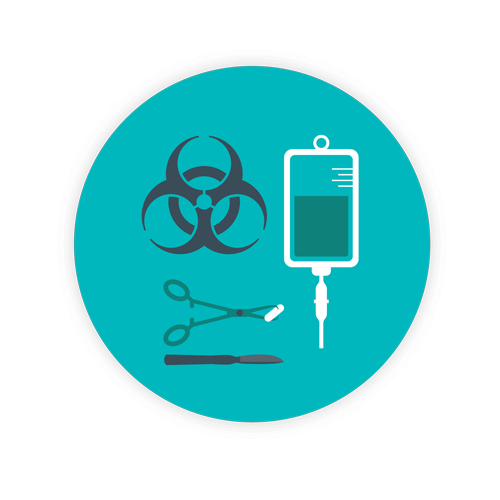Medical Waste Considerations for Surgical Centers

Answer this question: Are outpatient surgical centers held to the same standards when it comes to medical waste handling and disposal as a hospital?
Actually, they are. But wait, you might say: an outpatient or ambulatory surgical center doesn’t generate the same volume of waste as a hospital, so what’s the big deal? The truth of the matter is, an outpatient surgical center (depending on the type of procedures or services offered) generates much the same type of waste stream medical waste as a hospital. For example:
- Anatomical waste
- Chemo waste
- Biohazard waste
- Infectious waste
- Surgical waste
- Microbiological waste
Sound familiar? In addition, an ambulatory surgical center must also deal with sharps, sharps container regulations, and medical waste removal from the property.
Know your facility. Know the laws.
A surgical center produces much of the same type of waste as an OR, although sometimes to a lesser degree. Under general definitions, solid waste can be defined as trash that contains nonregulated medical waste. However, what about waste found in suction containers or canisters? These would fall under applicable rules and guidelines for liquid waste, and may contain body fluids, blood, or pharmaceutical drugs. What about anesthesia waste? Do you know the rules in your state (plus federal regulations) for proper handling, segregation, and disposal of your different waste streams? Do you deal with potentially infectious waste, meaning biohazardous waste, and red bag waste?
Daniels Health knows that it can be challenging to not only find long-term, sustainable, and compliant methods for waste segregation and disposal processes for different waste stream analysis, but also to ensure that rules are being followed based on federal and state guidelines.
Don’t forget that state regulations for proper medical or healthcare waste management are often more stringent than the federal guidelines, but both must be followed. Non-compliance can cost your facility tens of thousands of dollars a day per violation. Those fines accrue on a daily basis until the non-compliant issue or process is resolved.
Where do you find surgical center waste disposal guidelines?
Most states provide codes of regulation regarding health facilities and ambulatory surgical centers. For example, the state of Colorado provides a document (Standards for Hospitals and Healthcare Facilities: Chapter 20 – Ambulatory Surgical Center) with such rules in their Code of Colorado Regulations (6 CCR 1011-1 chapter 20). This document describes quite a long list of what medical waste means for Colorado’s outpatient surgical centers, a portion of which includes:
“any infectious, pharmaceutical, or trace chemotherapy waste generated in a healthcare setting in the diagnosis, treatment, immunization, or care of humans or animals; generated in autopsy or necropsy; generated during preparation of a body for final disposition such as cremation or internment… research pertaining to the production or testing of microbiologicals …”
If you keep reading however, you’ll find that in the state of Colorado, as per this definition,
“medical waste does not include fluids, tissues or body parts removed from the whole body for the purpose of donation, research or other use, or those returned to the person from whom they were removed,…as long as the material is rendered safer handling…”
California’s guidelines for medical waste management and disposal in regard to surgical centers can be a little harder to define. In many cases, such as in California, more than one agency sets rules. The California Department of Public Health has their set of regulations, while OSHA has theirs. In many cases, state guidelines refer to federal guidelines. For example, in California, sharps container parameters are found in code 117750 and state:
“(a) “sharps container” means a rigid puncture resistant container used in patient care or research activities meeting the standards of, and receiving approval from, the United States FDA as a medical device used for the collection of discarded medical needles or other sharps. (b) Sharps containers, including those used to containerize trace chemotherapeutic wastes, shall not be lined with a plastic bag or inner liner.”
Every state may have different guidelines, definitions, and standards for not only sharps container structure and placement, but entire waste stream management that enhances employee safety, public health, and of course, protects the environment. In the state of Alabama, regulations regarding medical waste are found under Alabama’s Department of Environmental Management – Land Division – Medical Waste Program, Division 17, and provides information regarding definitions and penalties for violations, as well as information for medical waste generators (chapter 335-17-2), collection of medical waste, storage, and transportation and treatment of medical waste.
Daniels Health supports the cradle-to-grave approach
Daniels Health is aware of the variety of circumstances, equipment, and potential medical waste generated by a surgical center. That’s why we provide long-term, cost-effective, and safe solutions for ambulatory/ outpatient surgical centers. We know that surgical waste, or any pathological waste removed from a patient during surgery is categorized as hazardous waste and must be properly disposed of in a hazardous waste container.
We also support the cradle-to-grave approach – an essential process for the management of proper medical waste disposal, which is the responsibility of the medical waste generator. No one else. Following local and federal laws that govern safe and proper healthcare waste disposal is essential. It involves more than putting waste into red bags or making sure that your sharps container placement is safe and manageable. It means proper handling of all types of medical waste streams, including biohazard waste that must be handled in such a way that protects employees, the public health, and the environment.

Make sure you understand the medical waste handling regulations that govern your practice
When it comes to sharps and medical waste handling in a surgical center or OR environment, it’s ultimately about compliance and accountability. Regardless of the size, processes, procedures, or patients your surgical center services, it’s your responsibility to follow the rules and maintain compliance. For more information on how Daniels Health can ensure such regulations are followed, as well as providing cost-effective and long-term solutions to healthcare waste management, give Daniels Health a call today.
Let's Talk!
Your time is valuable, and we don’t want to play hard to get. You can either phone us directly on the details listed on our contact page, or feel free to fill out this short form and one of our team members will get back to you as quickly as possible.
